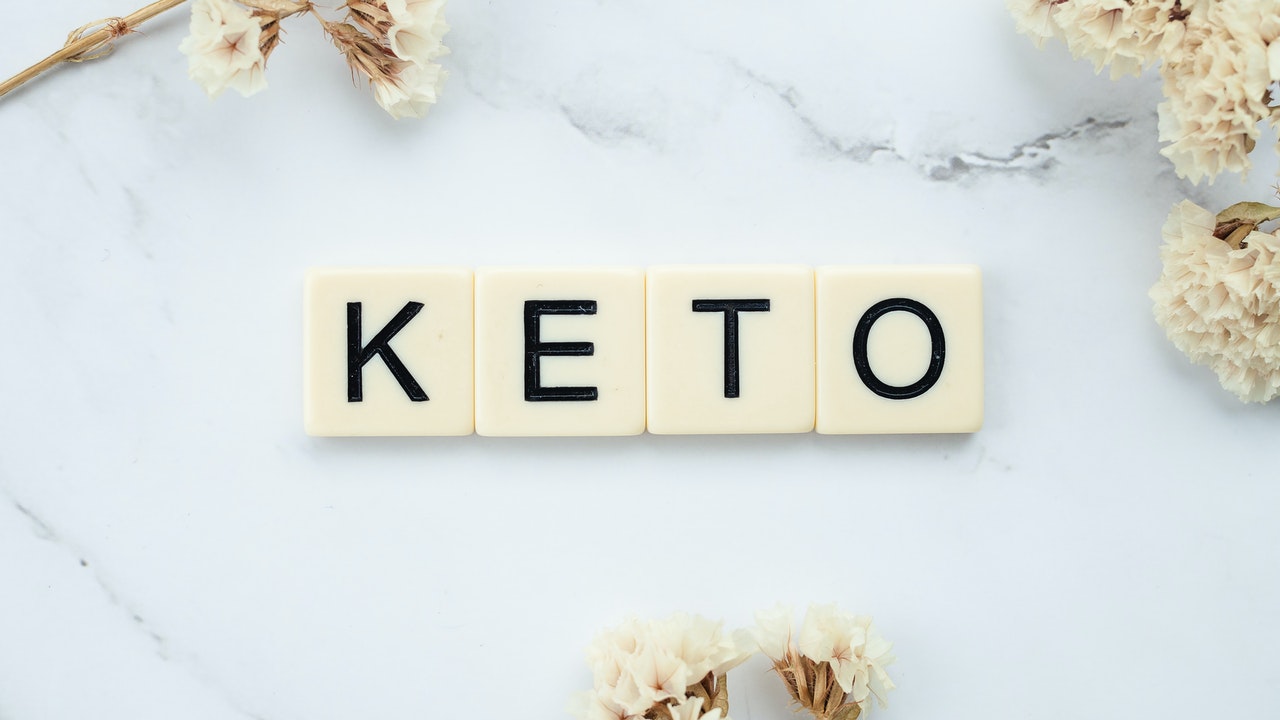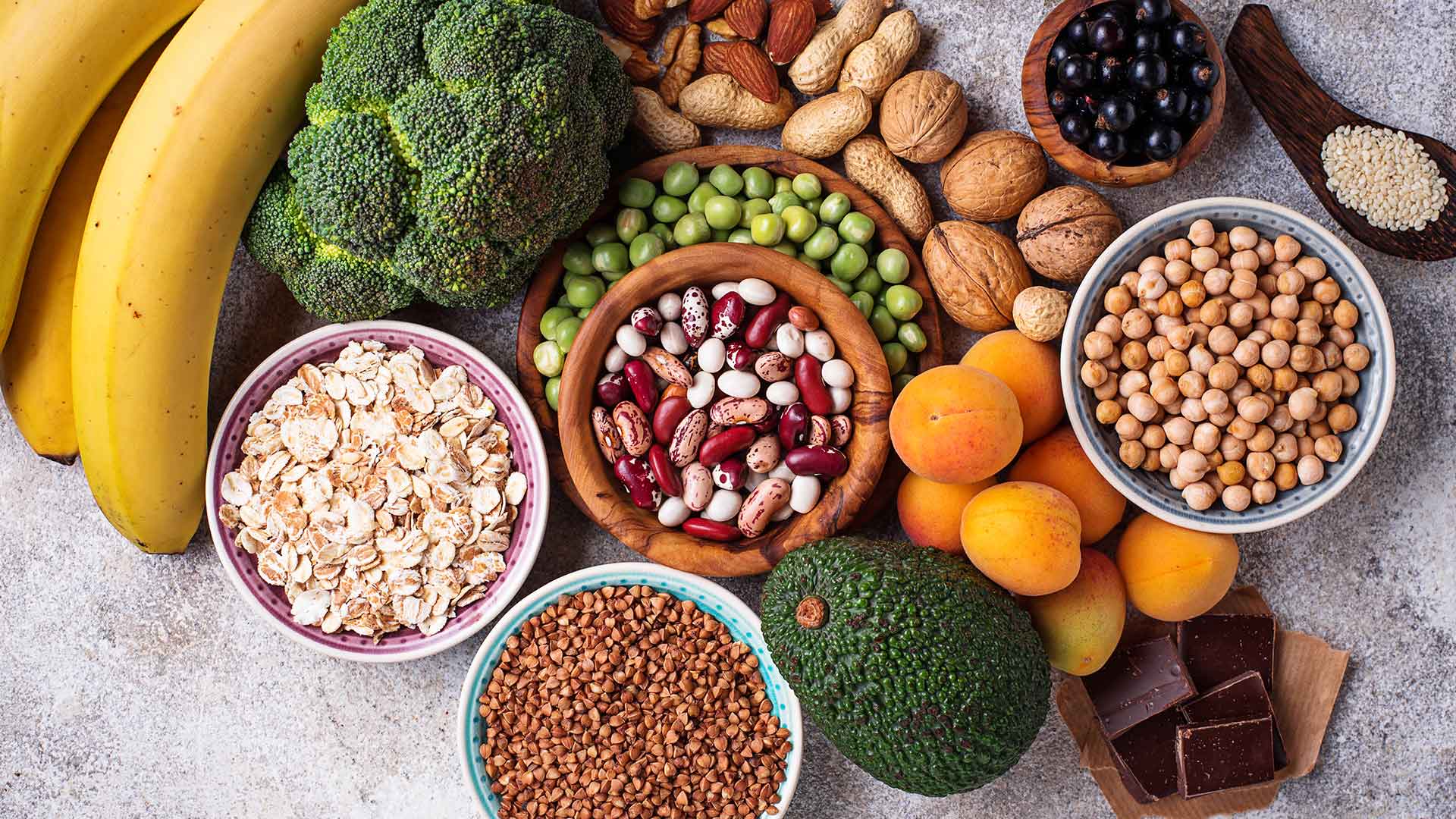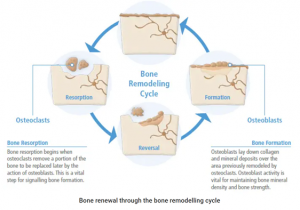Remember the campaigns: Got milk? Or Milk does a body good? If you’re like me, you probably had a glass of milk a day as a kid to help you grow tall and keep your bones strong. Even now, when you think about nutrients to support your bones, calcium is probably first to come to mind, and then maybe vitamin D. The campaigns weren’t wrong – both calcium and vitamin D are vital for your bones, but there are other nutrients that also play a major part in your bone health.
But first: Let’s look beyond the bare bones
A common misconception about your bones is that they’re dead. (Not true!) Your bones are living tissue that’s continually remodeled in phases—resorption and formation—to stay healthy and strong. In resorption, your body breaks down old and damaged bone with cells called osteoclasts; during formation, it does the opposite: Cells known as osteoblasts build new bone. This process of remodeling is incredibly important and any imbalances, like cells being broken down too fast, can increase the risk for certain health conditions related to bone loss.

Image from the International Osteoporosis Foundation
Your bones have a dense network of blood vessels, nerves, and cells, and it’s important to keep every part of this network healthy, so it can give your bones what they need to build and maintain mass and density.
Here are 6 nutrients we need to help keep your bones moving.
- Magnesium
Interesting fact: magnesium is the second most abundant mineral in cells—and about 60% of it is stored in your bones (that’s no small amount!). It’s there for good reason, as magnesium has two active roles in bone health: It regulates a mineral called hydroxyapatite and helps convert vitamin D to a form that can assist with calcium absorption. You’ll find magnesium in foods like pumpkin seeds, legumes and spinach, but cooking tends to reduce it significantly. For this and other reasons, about 48% of Americans don’t get enough in their diet, according to a 2013 – 2016 analysis.
Adding a magnesium supplement to your daily regime can help fill this gap. Magnesium glycinate may be preferred since it is easier to absorb than some other forms and has fewer side effects like diarrhea, according to research.
- Vitamin K
This one might be surprising, as vitamin K is typically known for its role in blood clotting. Research shows that vitamin K helps manage resorption of osteoblasts (cells that build new bone). Your body also relies on vitamin K to build and activate certain proteins like osteocalcin, which binds calcium to bones, giving them their strength and flexibility. Of the 3 forms of vitamin K, vitamin K2 is considered the all-star—the most effective for bone health. It’s found in foods like natto, sauerkraut, and beef liver.
Good news: for postmenopausal women taking a bisphosphate medication to slow bone loss, there’s growing evidence that taking vitamin K2 with your medication has better results, preventing fractures and supporting bone health.
- Vitamin A
Vitamin A plays a vital role in our vision, reproduction, immunity, and cellular health. Though more research is needed, it’s also believed to support your bones—particularly in the hip, thigh, and lower back. So if you’re interested in bone health, it might be worth seeking out.
There are 2 forms of vitamin A you can obtain from your diet: retinol and carotenoids. Retinol, the active form of vitamin A, is the easiest for your body to absorb and use right away. It’s found in animal-based foods like whole milk, animal liver and eggs. Carotenoids, which your body has to convert to activate, can be found in plant-based foods like carrots, leafy greens and sweet potatoes.
Regardless of which you choose, remember that getting too much of a good thing isn’t always better. Research shows that excessive amounts of vitamin A can actually have the opposite effect on your bones, increasing risks for hip fractures. So if you opt for a vitamin A supplement, it’s best to stay within the recommended daily dose, unless your doctor says otherwise.
- Protein
Your bones are made of four things: minerals, lipids (fats), water and protein. That last one, protein, falls into two categories: collagen and non-collagen. Collagen, the main protein found in your body, plays a vital role in supporting the strength and structure of your bones, while non-collagen proteins support them with signaling and movement. For this reason, eating protein is vital to your bone health.
But before you start heaping your plate with steak, be sure to consider the quality and amount of protein you are consuming—more isn’t always better. In extreme amounts, protein can actually damage your bone health by causing calcium to be excreted in the urine, according to a review in The American Journal of Clinical Nutrition. In general, it’s best to aim for moderate protein intake: 1-1.5 grams per kilogram of body weight per day.
- Phosphorus
Phosphorus is a mineral involved in producing energy, bone growth, and bone mineralization. It’s often used as a food additive and preservative, so it’s easy to get enough of it in your diet—and in fact a lot of people to get too much. Excess levels can leech calcium from bones and worsen bone health, so keeping phosphorus at the right level is extremely important.
If you’re trying to lower your phosphorus levels, be mindful about how much processed foods you’re eating. Avoid inorganic phosphorus as a preservative, and choose protein-rich, whole foods like soybean, meat and eggs.
- Potassium
If you love cereal, sugar, high-protein and processed foods—and tend to avoid fruits and vegetables—I have bad news: Your diet might be too acidic. The acid-ash hypothesis suggests that the high acidity may be weakening your bones. The good news is, there’s a way to fight back: potassium citrate and other alkaline potassium salts are thought to counteract that acidity and protect against bone loss. It’s possible that this is a result of potassium’s role as a kind of buffer that keeps your body at a healthy pH between 7.35 and 7.45—but whether this is the explanation behind potassium’s apparently positive effect on bones is still being researched.
About Ruby
Ruby is a registered pharmacist, board certified-medication management specialist, and personal chef. She believes that whole health creates more vibrant living and is a strong advocate for integrative wellness.
Do you have questions on how you may benefit from supplements? Reach out to one of our experts, or take Persona’s free nutrition assessment, and learn exactly what you need to take your wellness to the next level.
This information is not intended as a substitute for the advice provided by your physician or other healthcare professional, or any information contained on or in any product label or packaging. Do not use the information from this article for diagnosing or treating a health problem or disease, or prescribing medication or other treatment. Always speak with your physician or other healthcare professional before taking any medication or nutritional, herbal, or homeopathic supplement, or using any treatment for a health problem. If you have or suspect that you have a medical problem, contact your health care provider promptly. Do not disregard professional medical advice or delay in seeking professional advice because of something you have read in this article.











